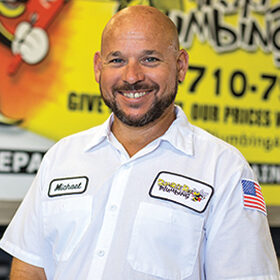When you finish eating dinner and have to clean the kitchen before going to bed, you probably don’t think twice about dumping leftover food scraps into the sink. A garbage disposal makes life easy, knowing you can cook and clean without clogging the sink. But it’s not a foolproof device.
If your garbage disposal is not working, learn how to troubleshoot and fix the five most common problems here!
Garbage Disposal Will Not Turn On
Did your garbage disposal “die” when you needed it the most? Don’t panic! It’s likely your unit has simply lost power. First, check to see whether it’s plugged in properly — you’d be surprised how many times plumbers find this to be the reason why garbage disposal is not working. Make sure the plug fits snuggly into the outlet, as a loose connection will not allow your garbage disposal to turn on.
Once it’s plugged in, has the power to the garbage disposal been restored? Do you hear the humming sound of the motor running? If not, try pressing the reset button. An electrical issue may have caused the button to trip, in which case it will have popped out slightly.
Still no luck? Check the main service panel to see whether a circuit breaker has tripped. Any other electrical issues will have to be inspected by a professional.
Garbage Disposal Hums but Doesn’t Work
If you’re troubleshooting a garbage disposal that won’t grind but makes a humming sound when it’s turned on (indicating that the motor is running), you likely have a foreign object stuck in the blades. Trying to run a disposal that is jammed can burn out the motor. As a result, the unit will probably turn itself off and have to be reset. Just to be extra cautious, make sure you turn off the power by unplugging the unit.
There are different ways to fix clogged garbage disposal. First, perform a visual inspection with a flashlight to see what’s causing the problem. You can use a combination of baking soda and vinegar to break down food clogs and grease. Let this mixture sit in the disposal for 20 minutes before flushing it down the drain with hot water. Try a plunger if this isn’t enough to get rid of the clog.
Is silverware or another foreign object jamming the disposal? Use pliers or tongs to reach between the blades and grab the loose item.
Sometimes, you may have to open the actual disposal unit. If you’re handy with tools, all you will need is a hex wrench or Allen wrench. However, it’s best to call the pros if your garbage disposal is not working due to a clog.
Garbage Disposal Leaks
What’s all that pooling water under your sink? The garbage disposal could be leaking. You can try to locate the source of the leak by checking the following:
- Sink Flange: The constant vibration of the motor can loosen the sink flange, which connects the unit to the sink drain opening.
- Dishwasher Connection: The hose that transports wastewater from the dishwasher to the garbage disposal can wear down or become loose at the clamp.
- Discharge Drainpipe: Once the food has been ground up in the garbage disposal, it exits the unit via the discharge drainpipe and eventually flows through the drain line to the sewers. The connection between the disposal unit and the pipe can wear down, causing a leak.
Even if you do manage to troubleshoot a garbage disposal leak, it’s best to leave repairs to trained plumbers. Installing any of these components incorrectly could lead to a bigger issue down the road.
Garbage Disposal Drains Slowly
When the garbage disposal is working properly, it will instantaneously take in food scraps and grind them up. But if this process takes a while, you might be understandably concerned that something is wrong.
A clog is the most common reason your garbage disposal drains slowly, especially if you’ve been feeding it food that’s not so easy to break down. Always avoid dumping grease, coffee ground, eggshells, onion skins, celery, potato peels, fibrous or stringy vegetables, pits, seeds, nuts, shells, bones, rice, bread, pasta, or expandable foods down the drain. These will not only damage your disposal but also clog your drain.
Troubleshooting a garbage disposal that drains slowly might be easy but cleaning it isn’t. Get in touch with a plumber for help — and inquire about scheduling a drain cleaning as well to avoid a slow-draining sink shortly.
Garbage Disposal Smells Bad
Nothing makes your kitchen reek faster than a smelly garbage disposal. Yuck! Where is the stench coming from?
Over time, food particles can accumulate in the unit and rot, releasing pungent odors that stink up your whole kitchen. This doesn’t mean garbage disposal is not working — just that it’s time for deep cleaning.
Thankfully, this is something you can take care of with a baking soda and vinegar solution. Dump one cup of baking soda followed by one cup of vinegar down your drain. Let the mixture sit for 20 minutes, then flush with hot water. You can also grind up some citrus rinds for a fresh, clean scent.
Whatever you do, avoid throwing coffee grounds into your garbage disposal! Some homeowners use coffee grounds as an odor neutralizer without thinking about the consequences to their drains. Enough running water can turn coffee grounds into sludge that clogs the pipes.
Is Your Garbage Disposal Not Working? Call Bumble Bee Plumbing!
Skip the inconvenience of troubleshooting broken garbage disposal by getting in touch with Glendale’s top plumbers.
Bumble Bee Plumbing offers the leading garbage disposal repair services! Our team has worked on all makes and models of disposals, and we’re confident that we can fix whatever problem you’re experiencing.

